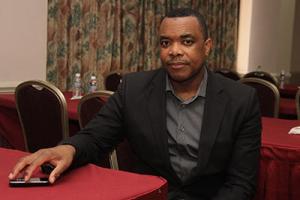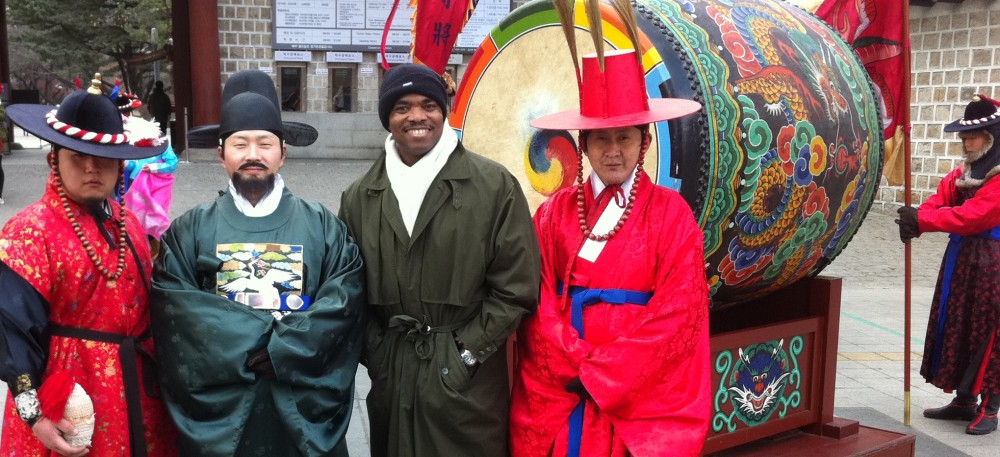
The delegation met with several newspaper owners, including here in the Dominican Republic.
I’ve just returned from almost two weeks in South America and the Caribbean as part of a mission with the Austria-based International Press Institute, the oldest press-freedom organization in the world. I serve as the IPI’s North American Chairman. Our top goal was to talk with politicians, academics and journalists about repealing criminal defamation from penal codes in the region. No journalist should have to go to jail for what they write or broadcast; issues of libel or slander should best be dealt with in civil courts.
We had far more success than we expected. Go here to read IPI releases about the mission. I later flew to Haiti to celebrate the grand opening of my friend Jeanguy Saintus’ new studio for Ayikodans, the country’s preeminent dance company. His former studio was destroyed in the 2010 earthquake.
Traveling is fraught with challenges, opportunities and danger. Here’s a behind-the-scenes look at my two weeks on the road.
DON’T MAKE ME LATE
During a layover in Port of Spain, Dutch Ambassador Lucita Moeniralam, who represents the Eastern Caribbean, and I agreed to meet for lunch at the Trinidad Hyatt. When she arrived, she said she hoped I did not rent a car because she was headed to the airport after lunch and would give me a ride back. That should have been a warning. The Hyatt is among the best lunch spots in the country. The food did not disappoint. And Lucita, a friend whom I’ve known for years, had lots to talk about. The topics included a major party she was throwing in a week to mark the abdication of Queen Beatrix and the investiture of King Willem-Alexander. Trinidad’s new president would be among her guests.

The Dutch flag, which flew on the Ambassador’s car.
Before I knew it, the time I had in my mind for us to leave had gone by. We quickly got up and hustled to Lucita’s car, skipping dessert. “We have 20 minutes to get to the airport,” she told her driver. Problem is, the airport is 30 minutes away – even more in traffic. Sure enough, we pulled out of the Hyatt and hit a wall of traffic. I kept my cool as we maneuvered through traffic, even taking some shortcuts I didn’t know exited. The flag flying from the front bumper helped. Trinis were surprisingly respectful, allowing us slip into ahead of them. We got to the airport with a minute to spare. Lucita hopped out the car and walked with me to the airline counter just in case the flight had closed. The agent smiled. I wasn’t late.
At security, I heard a commotion and looked around. Prime Minister Kamla Persad Bissessar had arrived for her flight with a large entourage. Could that be why traffic was so horrible at midday?
WHERE’S MY CARD?
I called my bank before leaving home as I sometimes do to alert them to the countries I planned to visit. In Santo Domingo, I went to an ATM next to a large supermarket on the Calle El Conde pedestrian mall, which I’ve used on previous visits. The machine accepted my card then nothing happened. My card was gone. And nothing I could do would eject it.

Calle El Conde, usually buzzing with pedestrians.
The machine belonged to one of the large banks. I called the number next to the keypad for problems with the machine. I was told the bank services the machine at 2 p.m. They would locate the card and send it to my hotel. I walked to my hotel replaying what happened in my head. At the hotel, I called my bank to report what that my card had been captured by the machine and asked for a freeze to be placed on my account. In the short time sine the card disappeared, I was told a charge had come in for $500 or roughly 20,000 pesos and another was being processed. I immediately canceled the card. The bank reminded me that I had zero liability for charges under such circumstances and the charges will be reversed. Thankfully, my liability in this case was only one of inconvenience.
IS THERE A DOCTOR IN THE HOUSE?

Workshop that I had to leave.
I was bitten by a bug in Suriname. I thought it was a mosquito but the swelling and discoloration that followed made me think it wasn’t a mosquito. Strangely, mosquitoes seldom bite me. No idea why. In the Dominican Republic, several days later, I became concerned when the swelling would not go down. At a meeting with local journalists in San Francisco de Macoris, I became after feeling a little lightheaded. I pulled up my pant leg and showed the swelling to IPI Executive Director Alison Bethel McKenzie, who was sitting next to me. The look on her face told me this is bad. In fact, it almost scared me! We showed it to the president of the association and she led us out of the room and to a nearby pharmacy. Luckily, her daughter is a doctor, who talked to the pharmacist about what meds to buy. The swelling has gone away and my foot, so far, has been saved.
DON’T FORGET THE FLOWERS

The lucky ladies with their flowers.
After dinner on Saturday night, IPI Executive Director Alison Bethel McKenzie, FIU associate journalism professor Mercedes Vigon and I grabbed some chairs in the beautiful courtyard at the Hotel Santo Domingo and settled in for a drink. A number of people were mulling around. We later realized that they were part of a wedding party. As we sat and talked, the party broke up. The bride and groom left, followed by their family and friends.Workers soon arrived to brake down the decorations. What to do with the spectacular floral arrangements? They decided to give them to us. We graciously accepted then passed them along to a couple of women sitting on the other side of the courtyard. I could tell that we made their night.
WHERE’S THE CHEF?
At dinner one night in Suriname, we checked out a hot Chinese restaurant. The young waiter didn’t know much about the food since he didn’t like Chinese food. And he didn’t know much about local drinks since he didn’t drink. No matter. We placed out order and waited. And waited. An hour later, we called him over and asked where’s our meal. We couldn’t believe his response: “The cooks are on break.” It was only 9 p.m. and the restaurant was almost full. Who allows the cooks to go on a break? We asked to see the manager. She arrived with an apology. And she couldn’t believe what her waiter told us. “They were not on break,” she said. “He forgot to turn in your order.” She said she told him to go over and tell us what happened. Instead, he made up a crazy story. Very crazy. Would love to say the food was worth the wait. It wasn’t.
IF MUSIC IS THE FOOD OF LIFE …

At the Ayikodans studio reopening.
Many people have said that Haiti is a smorgasbord of culture. And they’re right. Whether you’re interested in music, dance or art, you can find it in abundance in Haiti. I have for years supported the Ayikodans dance company, which has come back strong after the country’s devastating earthquake three years ago. I was honored to be in Port-au-Prince for the reopening of the company’s dance studio, which was destroyed in the quake.

Silibo members blowing the roof off the room.
While there, my friend Youri Mevs took a small group of friends into a neighborhood behind the Kinam Hotel to meet some of her friends. We weren’t sure of what to expect. Them the young men pulled out their horns. And music filled the small room. The group is called Silibo, meaning a place of happiness. And the room was that and more Monday afternoon.
As Silibo played, residents elbowed their way into the room. Others pushed against a small window, their eyes peeking into the room. It was magical.

Residents press against half-open window to peek into the room.
The group has been around for 12 years and plays mostly for fun. Check out some of their music here. Youri’s dream is to have some professional players from the U.S. come to Haiti to spend time teaching and learning from Silibo. Youri is passionate about anything she’s committed to and I have do doubt that will happen. When it does, count me in for the finale.
 I was recently in Trinidad to participate in a series of workshops on media self-regulation and election coverage. It was a great experience and I believe progress was made in efforts to advance press freedom in the Caribbean and in deepening election reporting. One of the local newspapers, the Trinidad Guardian, sat down with me for a report on my visit. Journalist Reshma Ragoonath did a good job of capturing our conversation and my various presentations over the two-day session. Here’s some of her report:
I was recently in Trinidad to participate in a series of workshops on media self-regulation and election coverage. It was a great experience and I believe progress was made in efforts to advance press freedom in the Caribbean and in deepening election reporting. One of the local newspapers, the Trinidad Guardian, sat down with me for a report on my visit. Journalist Reshma Ragoonath did a good job of capturing our conversation and my various presentations over the two-day session. Here’s some of her report:







